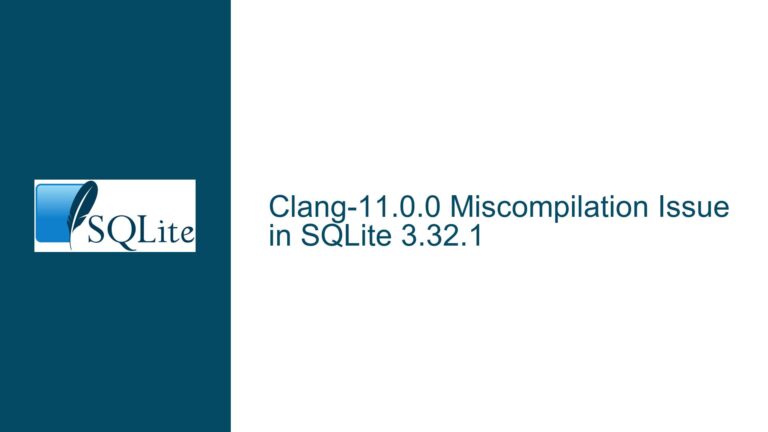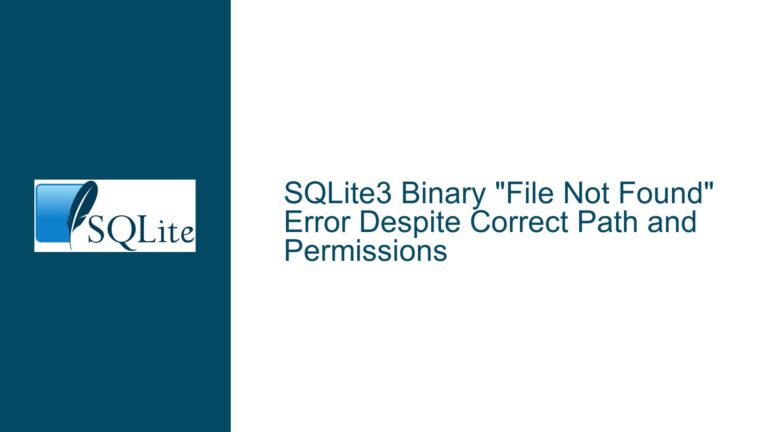Extending SQLite3 API for Custom Error Codes and Messages
Returning Specific Error Codes with Custom Messages in SQLite Extensions
The ability to return specific error codes alongside custom error messages from SQLite extension functions is a nuanced but critical feature for both SQL developers and application developers. Currently, the SQLite3 API provides two distinct methods for handling errors: sqlite3_result_error() and sqlite3_result_error_code(). The former allows developers to return a custom error message with a generic SQLITE_ERROR code, while the latter enables the return of a specific error code but with a stock error message. This dichotomy creates a gap in functionality, particularly for developers who need to return both a specific error code and a tailored error message. This limitation can hinder the usability of SQLite extensions in scenarios where precise error handling is required.
The proposed addition of a new function, sqlite3_result_error_info(), aims to bridge this gap by allowing developers to specify both an error code and a custom error message. This function would be particularly useful in scenarios where the error context is complex and requires detailed explanation, while still necessitating a specific error code for programmatic handling. For example, in a financial application, an extension function might need to return an error indicating an insufficient balance, with both a specific error code (e.g., SQLITE_INSUFFICIENT_BALANCE) and a custom message explaining the exact shortfall.
The absence of such a function in the current API can lead to suboptimal error handling strategies. SQL developers might resort to using generic error codes, which can obscure the root cause of the issue, while application developers might have to parse error messages to extract meaningful information, which is both error-prone and inefficient. The proposed sqlite3_result_error_info() function would streamline error handling by providing a unified mechanism for returning both error codes and messages, thereby enhancing the robustness and usability of SQLite extensions.
Limitations of Current Error Handling Mechanisms in SQLite Extensions
The current error handling mechanisms in SQLite extensions are limited by their inability to simultaneously return a specific error code and a custom error message. The sqlite3_result_error() function allows developers to return a custom error message but defaults to the generic SQLITE_ERROR code. This can be problematic in scenarios where the error context is complex and requires a specific error code for proper handling. For instance, in a multi-tenant database system, an extension function might need to return an error indicating a tenant-specific issue, such as a quota exceeded error. Using sqlite3_result_error() would only allow the function to return a generic error code, making it difficult for the application to determine the exact nature of the issue.
On the other hand, the sqlite3_result_error_code() function allows developers to return a specific error code but does not support custom error messages. This can be equally problematic, as the stock error messages provided by SQLite may not adequately describe the error context. For example, in a data validation extension, an error indicating invalid input data might require a custom message detailing the specific validation rule that was violated. Using sqlite3_result_error_code() would only allow the function to return a stock message, which might not provide sufficient information for debugging or user feedback.
These limitations can lead to a fragmented error handling strategy, where developers are forced to choose between returning meaningful error messages or specific error codes. This can result in either opaque error codes that do not provide enough context or generic error messages that do not facilitate programmatic handling. The proposed sqlite3_result_error_info() function would address these limitations by allowing developers to return both a specific error code and a custom error message, thereby providing a more comprehensive error handling mechanism.
Implementing sqlite3_result_error_info for Enhanced Error Handling
The implementation of the sqlite3_result_error_info() function would involve extending the SQLite3 API to support the simultaneous return of a specific error code and a custom error message. The function would take four parameters: a pointer to the sqlite3_context object, a pointer to the custom error message, the length of the error message, and the specific error code. The function would then set the error code and message in the sqlite3_context object, which would be returned to the caller.
The implementation would require modifications to the vdbeapi.c source file, where the existing error handling functions are defined. The new function would need to ensure that both the error code and message are correctly propagated through the SQLite execution engine, so that they are available to the calling application. This would involve updating the relevant data structures and ensuring that the error information is correctly serialized and deserialized during query execution.
In addition to the core implementation, the new function would need to be thoroughly tested to ensure that it behaves correctly in all scenarios. This would include testing with various error codes and messages, as well as testing in conjunction with other SQLite features such as transactions, triggers, and views. The function would also need to be documented, with clear examples of how to use it in different contexts.
The introduction of sqlite3_result_error_info() would provide a significant enhancement to the SQLite3 API, enabling developers to create more robust and user-friendly extensions. By allowing the simultaneous return of specific error codes and custom error messages, the function would streamline error handling and improve the overall usability of SQLite extensions. This would be particularly beneficial in complex applications where precise error handling is critical, such as financial systems, data validation tools, and multi-tenant databases.
Detailed Analysis of the Proposed sqlite3_result_error_info Function
The proposed sqlite3_result_error_info() function would be a valuable addition to the SQLite3 API, providing a unified mechanism for returning both specific error codes and custom error messages. The function would be defined as follows:
SQLITE_API void sqlite3_result_error_info(sqlite3_context *pCtx, const char *zError, int cbError, int errCode);
The function would take four parameters: a pointer to the sqlite3_context object (pCtx), a pointer to the custom error message (zError), the length of the error message (cbError), and the specific error code (errCode). The function would then set the error code and message in the sqlite3_context object, which would be returned to the caller.
The implementation of the function would involve updating the sqlite3_context data structure to store both the error code and message. This would require adding new fields to the structure and modifying the existing error handling logic to ensure that both the code and message are correctly propagated through the SQLite execution engine. The function would also need to handle edge cases, such as null or empty error messages, and ensure that the error information is correctly serialized and deserialized during query execution.
The function would be particularly useful in scenarios where the error context is complex and requires detailed explanation, while still necessitating a specific error code for programmatic handling. For example, in a financial application, an extension function might need to return an error indicating an insufficient balance, with both a specific error code (e.g., SQLITE_INSUFFICIENT_BALANCE) and a custom message explaining the exact shortfall. The sqlite3_result_error_info() function would allow the extension to return both the code and message, providing a more comprehensive error handling mechanism.
Testing and Validation of the sqlite3_result_error_info Function
The testing and validation of the sqlite3_result_error_info() function would be a critical step in ensuring its correctness and reliability. The function would need to be tested in a variety of scenarios, including different error codes and messages, as well as in conjunction with other SQLite features such as transactions, triggers, and views. The testing process would involve creating a series of test cases that cover all possible use cases of the function, including edge cases such as null or empty error messages.
The test cases would be designed to verify that the function correctly sets the error code and message in the sqlite3_context object, and that this information is correctly propagated through the SQLite execution engine. The tests would also verify that the function behaves correctly in conjunction with other SQLite features, such as transactions, triggers, and views. For example, a test case might involve creating a transaction that includes an extension function that uses sqlite3_result_error_info() to return an error, and verifying that the error is correctly handled by the transaction.
In addition to functional testing, the function would also need to be tested for performance and memory usage. This would involve creating a series of performance tests that measure the time and memory required to execute the function in different scenarios. The results of these tests would be used to identify any performance bottlenecks or memory leaks, and to optimize the function accordingly.
The testing process would also include documentation and examples, to ensure that developers understand how to use the function correctly. The documentation would include detailed descriptions of the function’s parameters and return values, as well as examples of how to use the function in different contexts. The examples would cover a range of scenarios, from simple error handling to complex error contexts, and would be designed to help developers quickly understand how to use the function in their own applications.
Integration of sqlite3_result_error_info with Existing SQLite Features
The integration of the sqlite3_result_error_info() function with existing SQLite features would be a key aspect of its implementation. The function would need to work seamlessly with other SQLite features such as transactions, triggers, and views, to ensure that it can be used in a wide range of scenarios. This would involve updating the relevant parts of the SQLite execution engine to handle the new error information, and ensuring that the function behaves correctly in conjunction with these features.
For example, in a transaction, the function would need to ensure that the error code and message are correctly propagated through the transaction, so that they are available to the calling application. This would involve updating the transaction handling logic to include the new error information, and ensuring that the information is correctly serialized and deserialized during transaction execution. Similarly, in a trigger, the function would need to ensure that the error code and message are correctly propagated through the trigger, so that they are available to the calling application.
The integration process would also involve testing the function in conjunction with these features, to ensure that it behaves correctly in all scenarios. This would include creating a series of test cases that cover all possible use cases of the function, including edge cases such as null or empty error messages. The tests would verify that the function correctly sets the error code and message in the sqlite3_context object, and that this information is correctly propagated through the SQLite execution engine.
The integration of the sqlite3_result_error_info() function with existing SQLite features would provide a significant enhancement to the SQLite3 API, enabling developers to create more robust and user-friendly extensions. By allowing the simultaneous return of specific error codes and custom error messages, the function would streamline error handling and improve the overall usability of SQLite extensions. This would be particularly beneficial in complex applications where precise error handling is critical, such as financial systems, data validation tools, and multi-tenant databases.
Conclusion
The proposed sqlite3_result_error_info() function represents a significant enhancement to the SQLite3 API, providing a unified mechanism for returning both specific error codes and custom error messages. This function would address the limitations of the current error handling mechanisms, enabling developers to create more robust and user-friendly extensions. The implementation of the function would involve extending the SQLite3 API, updating the relevant data structures, and ensuring that the error information is correctly propagated through the SQLite execution engine. The function would be thoroughly tested and validated, and integrated with existing SQLite features to ensure that it behaves correctly in all scenarios. The introduction of sqlite3_result_error_info() would streamline error handling and improve the overall usability of SQLite extensions, making it a valuable addition to the SQLite3 API.






